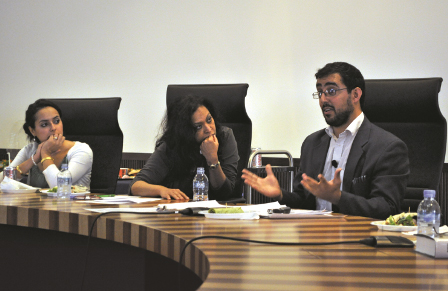Dialogue Series, Regional Studies
Aly Verjee on Current Events in Côte d'Ivoire, Djibouti, and Sudan

On April 10, 2011, CIRS and the African Student Club at Georgetown University in Qatar hosted a Focused Discussion with Aly Verjee, Senior Researcher at the Rift Valley Institute and a specialist on the contemporary politics of Africa. The lecture was on “Current Events in Côte d’Ivoire, Djibouti, and Sudan.” These were countries in which Verjee spent significant amounts of time conducting research and working as an elections observer.
Verjee began by describing current events in the Sudan and the possible outcomes of the recent referendum which was voted in favor of splitting the country into two. He argued that “One of the most interesting and important things about the referendum in Sudan was, of course, that it was accepted by both sides.” Despite the positives, Verjee said, the peace agreement privileges the ruling parties of both sides at the expense of the people. The referendum had very serious authoritarian undertones where the extremely high percentage of voter turnout was not necessarily due to an organically-formed civic mobilization movement, but, rather, because the ruling party went house to house to ensure all registered voters cast ballots. However, Verjee said, despite the exhilaration produced by radical social and political change to the country, it is important to not to lose sight of the unimplemented social and political rights of the people. Currently in Sudan, “We have this very unusual circumstance that the vote, which was largely democratic and which will herald the newest country in Africa, actually also means that we will have, from July when Southern Sudan becomes an independent country, two one-party states. That is a very unorthodox outcome of a democratic process,” Verjee argued.
Ever since the referendum took place, the international media has focused on describing what the “new” Sudan might look like. Since the north-south issue has become so prominent a topic, it is important not to forget the other areas of struggle such as Darfur and Kordofan, which have multi-ethnic and multi-religious populations that do not necessarily identify with the ruling Arab Muslim elite. The communities in these areas would like their rights respected and to enter into self-governance just as the south did.
The second country Verjee examined was “Djibouti, which is a stable country in a very unstable neighborhood.” The country is located in a geographically strategic area on the Bab el-Mandeb; the coastal gateway between the Gulf of Aden and the Red Sea, which is one of the busiest shipping channels in the world. Verjee said that “Djibouti itself is not important in terms of international trade, but is very important in the international trade of East Africa.” This is because “85 million Ethiopians depend on all their imports coming through the port of Djibouti” since Ethiopians can no longer rely on Eritrea as a seaport because of deteriorating relations after Eritrea’s secession from Ethiopia. Further, he noted, although Djibouti is at the heart of international anti-piracy and anti-terror operations and “the host of the only U.S. military base in the whole of Africa,” its strategic location is simultaneously important as a channel for illegal migration from Africa into Arabia and Europe.
Moving on to Côte d’Ivoire, Verjee said that most people in the world should have an interest in what happens there, not least because it “is the most important country in the world in determining the price of chocolate,” as it is a main producer and exporter of cocoa beans. However, despite the country’s relative wealth, civil war has plagued the country for most of the last decade, leading to large numbers of Internally Displaced Persons (IDPs). Currently, the country is again divided by the controversy surrounding the last round of presidential elections, where both Laurent Gbabgo and Alassane Ouattara claim that they are the true winners. “The elections that were held last year were supposed to end the crisis, but in fact, they have only deepened it,” he explained.
As a final thought, Verjee linked the three countries by drawing parallels between them, including the ways in which the media has shaped public perception and response to events in these places. Secondly, all three countries are linked by a history of disappointing interpretations of democratic elections. Thirdly, “in all three of these countries, there are strategic considerations” and each becomes prioritized internationally based on the richness of its resources or geographic location. Lastly, Verjee said, “In all three of these examples, we can see the prominence and centrality of individuals over systems.”
Aly Verjee is author of the recently published Race Against Time: the Countdown to the Referenda in Southern Sudan and Abyei. From 2006-2008, Verjee helped manage the logistics of the repatriation of Sudanese refugees from Kenya, Uganda, DR Congo and the Central African Republic. From 2008–2010, he helped lead the first ever international election observation mission in Sudan for The Carter Center. In addition, Verjee also has worked on various assignments in Afghanistan, Botswana, China, Cote d’Ivoire, DR Congo, Ghana, Kenya, Mozambique, Senegal, Somaliland and South Africa.